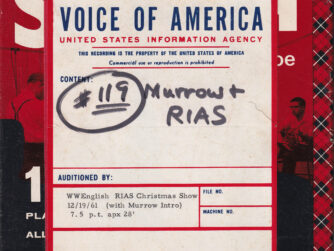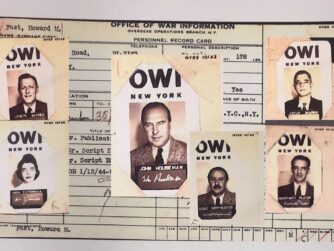Launched Religious Programming to the USSR
Senator MUNDT. What are you doing? We do not hear the broadcasts. I would like to know what you are doing. Mr. BARMINE. What we are doing? Yes. First of all, we don’t use music at all—no jazz music; no music at all—because we consider it is a waste of time to spend it on music when it is dangerous to listen. Our program content is half time news and halftime political commentaries. These political commentaries and features, dramatic presentations, are always sharply anti-Communist or are positively pro-American, describing the American way of life and freedom. We have also, by the way, regular religious programs, which we established about 2 years ago. Twice a month, Bishop John of San Francisco is broadcasting himself the religious sermons to Russia. Senator MUNDT. You are broadcasting a religious program to Russia? Mr. BARMINE. Yes. Twice a month we broadcast regularly. Then on Christmas and Eastertime we have special religious broadcasts four times a day. And I might add that, because we have new style and old Russian style [calendars], we are rather ahead of the American stations, because we present Christmas programs twice, on December 25 and January 7; and Easter programs also twice. Senator MUNDT. Have you had any disagreement with the head of your religious desk in New York about the desirability or the content of these religious programs? Mr. BARMINE. No, sir. I instituted this program before Mr. Lyons came on the job. But we work in perfect cooperation, and I have no difficulties or disagreement whatsoever. Senator MUNDT. He has not tried to interfere with you? Mr. BARMINE. No. sir. Senator MUNDT. Has the Washington office tried to interfere with you? Mr. BARMINE. No, sir. I am just not sure that they are well informed about the content of our religious broadcasts.
Until the early 1950s, the management in charge of the Voice of America and VOA English-language writers and editors did not appreciate the importance of religious programming to countries behind the Iron Curtain. An ex-Marxist and later anti-Communist, Bertram Wolfe, whom the Truman administration hired in 1950 to help reform programming and counter Soviet propaganda, could not find a single Voice of America English-language writer capable of understanding the deep need for religious freedom among VOA audiences living under communism. He had to write religious programs himself, even though he was an atheist.
When I went to work for the Voice of America in the period from 1950 to 1954, religious leaders and believers were being framed, tortured, and sent to concentration camps in all the countries under Communist rule in Eastern Europe. After trying to get my script writers to write effective radio broadcasts to defend the religious freedom of the churchmen and devout believers who were being thus persecuted, I found that I had to write the scripts myself to get the requisite feeling into them. I did not believe what the persecuted believed, but I did believe in their right to freedom to harbor and practice their beliefs without interference.1








